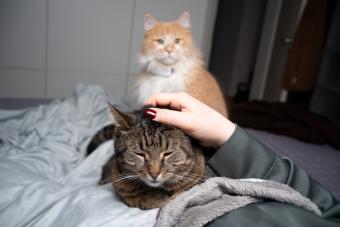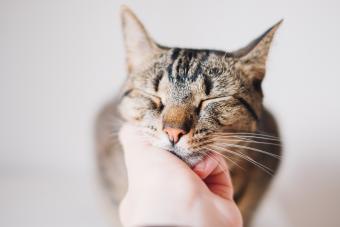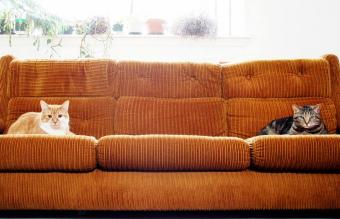
You just adopted a puppy or started dating someone new, and your cat begins acting strangely. Do cats get jealous? Most experts say cats don't feel true envy, but they can definitely become territorial or stressed with changes to their lifestyle. Even super subtle changes you probably aren't aware of, like not giving them quite as much attention as they're used to. Find out if your cat's behavior aligns with the signs they are jealous, along with how you can remedy the situation.
6 Reasons Your Cat Is Jealous
Is your cat jealous? It's possible. If your cat wants something that they can't have, they could start to act out. There are six common reasons cats will become jealous.
1. You Got Another Cat
Adopting a new cat, whether it's a kitten or an adult cat, can irk your existing pet. Your cat could easily become jealous because they now have to share their litter box, fuzzy blankets, and their favorite person in the world.
Signs your cat is jealous of your new cat:
- Suddenly becoming overly affectionate toward you
- Aggression toward the new cat or you
- Urinating and/or defecating outside the box
- Scratching or other destructive behaviors
- Blocking the new cat from doorways
- Hiding from you
How to help:
- Give your cat their own resources. Make sure your cat has their own resources, like a litter box, water bowl, food dish, and bed. Keep the new kitten out of them for a while until they begin to bond.
- Show your cat attention. Set aside time daily to give your cat dedicated bonding time with you. Leave the kitten in another room and pet, love on, and play with your cat, so they don't feel forgotten.
- Consider pheromones. Feline pheromone sprays can help bring down the tension in your house when introducing a new cat.
2. You Brought Home a New Pet

It doesn't just have to be a new cat your buddy is jealous of. If you brought home a new puppy, adult dog, bird, or any other pet that could take attention away from your cat, they could become jealous.
Signs your cat is jealous of your new pet:
- Invading your personal space
- Growling, hissing, or biting
- Urinating and/or defecating outside the box
- Scratching furniture
- Becoming reclusive
- Staring at the pet
How to help:
- Schedule bonding time with your cat. Make sure you have one-on-one bonding time with your cat that doesn't involve the new pet. Get out their favorite toys and give them your full attention to remind them you'll always be their number one.
- Give your cat a safe space. Create a calm place for your cat where they can retreat when they get overwhelmed or jealous. Make sure the new pet doesn't have access to this safe haven.
- Trim your cat's nails. You want to protect your new pet as well as your cat. Keep your cat's nails short to prevent any scratches to the face or eyes if your cat decides to give your pet a swat.
3. You Had a Baby

Having a new baby at home is undoubtedly a ton of work. Your hands will be full (figuratively and literally), so your cat probably won't get the attention they did before the baby's arrival. This often leads to jealousy, but that doesn't mean cats and babies can't coexist.
Signs your cat is jealous of your new baby:
- Constantly seeking your attention by meowing or pawing
- Acting aggressively toward the baby
- Acting out to get your attention
- Changes in appetite
- Excessive grooming
How to help:
- Desensitize your cat to baby things. Gradually get your cat used to baby smells and sounds with recordings. This is something you can do in the weeks leading up to baby's arrival.
- Don't force the introduction. Allow your cat to set the pace for when and how much they want to interact with the baby. Never force them to meet or play because this could only exacerbate the jealousy.
- Have cat dates. Have special baby-free dates with your cat, so they can get your undivided attention.
4. You're in a New Relationship
Did you just start dating someone new? That probably means you're away from home a lot or have this person over at your place often. Your cat could be jealous of this new love interest, and they often have a weird way of showing it.
Signs your cat is jealous of your new partner:
- Spraying urine on the new partner's belongings
- Being aggressive toward them
- Seeking your attention and affection all the time
- Hiding or being aloof
- Vocalizing excessively
How to help:
- Remind your cat you love them. It can be easy to get blinded by love but don't forget to give your kitty love as well. Carve out time for one-on-one petting sessions or involve your cat in activities with your partner, like games or making dinner.
- Create a positive experience around your new boo. When your cat sits on the couch next to your partner or lets them pet their head, give your kitty praise. Offer them a treat or verbal words of encouragement to create a positive experience around the new person.
- Give your cat their own territory. Choose a place your cat loves to relax and make it off-limits to your partner. That can serve as your cat's personal territory where they can retreat when they need some space.
5. You Changed Your Routine
Changing your routine can throw your cat for a loop. If you recently started a new job and are going into the office at unusual times, your cat definitely notices. It could make them feel unsettled or even jealous.
Signs your cat is jealous of your new routine:
- Ignoring you or hiding from you
- Changes in eating habits
- Peeing or pooping outside of the litter box
- Invading your space whenever you're home
- Scratching or destroying furniture
How to help:
- Keep their schedule the same. Cats are creatures of habit, so give them some stability by keeping their routine the same. That way, they'll know when they can expect to be fed, and eventually, they'll learn when they can expect you home, etc.
- Turn to enrichment. Keep your cat busy with enrichment activities, like interactive toys and Cat TV.
6. Your Cat Has Separation Anxiety
Cats who weren't socialized as kittens can develop an unhealthy attachment to their owners. In these scenarios, your cat could spiral into a jealous rage anytime you have a guest over, scroll on your phone, or even close the bathroom door, leaving them on the other side.
Signs your cat is jealous because they have separation anxiety:
- Following you around
- Overgrooming
- Destructive behaviors
- Trying to escape when you leave
- Vocalizing when you're gone
- Spraying urine when you're gone
How to help:
- Boost their confidence. Address your cat's separation anxiety to get them used to being alone and not having your full attention.
What to Do if Your Cat Turns Into a Green-Eyed Monster
As compassionate cat owners, we tend to assign human emotions and traits to our pets. Even though experts say cats don't necessarily experience jealousy, they show us behaviors that definitely resemble it. Help your cat manage anxiety or territorial stress triggered by new pets, people, or routines with these tricks. It's also important to have your cat examined by a vet to rule out any medical causes of these symptoms any time you're concerned.







